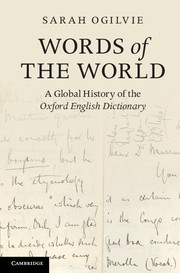Book contents
- Frontmatter
- Contents
- List of illustrations
- List of appendix figures
- Miscellaneous Frontmatter
- Preface
- Acknowledgements
- 1 Entering the OED
- 2 A global dictionary from the beginning
- 3 James Murray and Words of the World
- 4 James Murray and the Stanford Dictionary controversy
- 5 William Craigie, Charles Onions, and the mysterious case of the vanishing tramlines
- 6 Robert Burchfield and words of the world in the OED Supplements
- 7 Conclusion
- Bibliography
- Index
- Plate Section
5 - William Craigie, Charles Onions, and the mysterious case of the vanishing tramlines
Published online by Cambridge University Press: 05 November 2012
- Frontmatter
- Contents
- List of illustrations
- List of appendix figures
- Miscellaneous Frontmatter
- Preface
- Acknowledgements
- 1 Entering the OED
- 2 A global dictionary from the beginning
- 3 James Murray and Words of the World
- 4 James Murray and the Stanford Dictionary controversy
- 5 William Craigie, Charles Onions, and the mysterious case of the vanishing tramlines
- 6 Robert Burchfield and words of the world in the OED Supplements
- 7 Conclusion
- Bibliography
- Index
- Plate Section
Summary
As in the main work [OED1], there has been continually present the problem of the inclusion or omission of the more esoteric scientific terms and of the many foreign words reflecting the widened interest in the conditions and customs of remote countries, and it cannot be hoped or pretended that this problem has been solved in every instance with infallible discretion.
William Craigie and Charles Onions (1933), Editors of the 1933 SupplementThe men who succeeded Murray as editors of the OED were largely faithful to the lexicographic policies and practices that he had devised in the early 1880s. With respect to loanwords and World Englishes, however, the concept of naturalization – in sound, form, and meaning – changed over time, and as it turns out, in unexpected ways. In particular, the practice of putting tramlines beside headwords considered ‘alien or not yet naturalized’ was mysteriously dropped in the 1933 Supplement edited by William Craigie and Charles Onions, and was reinstated for Burchfield’s Supplement in the 1970s and 1980s.
This chapter started out to solve the mystery of the missing tramlines in the 1933 Supplement. Just before this book went to press, this mystery was solved quite simply by a chance discovery amongst uncatalogued items in the OUP archives – two pieces of paper confirmed months of detective work. But that detective work was not wasted. The very process of trying to find an answer to the question about the tramlines revealed larger issues about attitudes towards foreign words that were behind what may have seemed an inconsequential omission of a typographical symbol.
- Type
- Chapter
- Information
- Words of the WorldA Global History of the Oxford English Dictionary, pp. 134 - 164Publisher: Cambridge University PressPrint publication year: 2012



